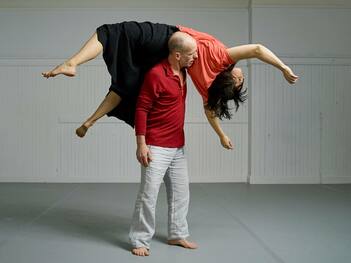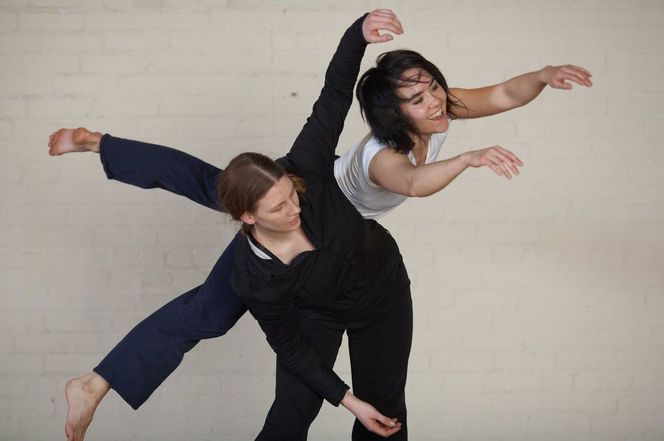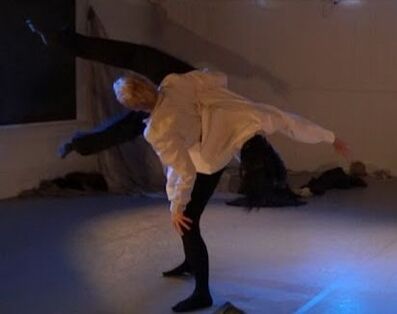|
Oct 6 to 8, 2023 "Falling Into Autumn" Dance Jam occurring at National Ballet School of Canada.
Register: https://events.eventzilla.net/.../torontos-falling-into... |
Seven Saturday late afternoon in the fall for advance Contact Improvisers with Kathleen Rea and Suzanne Liska.
Sept 16 / Sept 30 / Oct 21 / Oct 28 / Nov 4 / Nov 18 / Dec 16 3:00 to 5:30 Class 6:00 to 5:30 Jamming to practice what we have learned Railpath Arts Centre, 35 Golden Ave Suite 108, Toronto, ON M6R 2J5 Schedule (reasondetre.com) https://www.facebook.com/events/1008142113541635/1009564696732710/ |

5 Day C.I. workshop with Suzanne Liska and Mark Young.
Lesqueti, BC
June 30-July 6 2019
http://leviathan.lasqueti.ca/5day-contact-improv-with-mark-young-june30-july6
Mark will lead the morning class from 10am-noon. Suzanne will lead the afternoon class from 4-6pm. This workshop provides learning for all levels. It is skilled and technical, providing an opportunity for those who are newer to Contact Improv to gain some skills and the experienced dancer an opportunity to explore things in a new light.
Suzanne’s classes will integrate the Alexander Technique with CI. We will research how to access our underlying support, sensory awareness, spatial perception, strength and fluidity within CI. Through “hands-on work” as well as verbal guidance, Suzanne, the Alexander teacher will lead students to become more aware of and to change habits of misuse. The educational process of the Alexander Technique trains your kinesthetic coordination and enables you to begin to free patterns of tension to access your dynamic coordination. As we research CI informed by the Alexander Technique, ease of weight transition, smooth connection, effortless partnering, and depth of emotional expression result.
Suzanne Liska is a Certified Alexander Technique Teacher, dancer, choreographer, and researcher specializing in dance improvisation and somatics since 1998. Receiving grants and awards through York University, the Toronto Arts Council and Ontario Arts Council, she has choreographed and performed works presented for DanceWorks CoWorks, Dusk Dances, Dance Matters, and CanAsian KickStart. She has originated in roles for choreographers Maxine Heppner, Pam Johnson, Karen Kaeja, Susan Lee, Kathleen Rea and Takako Segawa. Suzanne has been a teacher since 2001 with Bachelor Degrees in Arts, Education and a SSHRC-funded MFA in Dance Choreography. She teaches professional dancers, actors, community dancers, and high school and elementary school students. Her main classes include Somatics (Alexander Technique), Solo, Contact, and Ensemble Improvisation/Composition and advanced partnering. Suzanne has taught workshop intensives for Collective Gulp in Ottawa, CCDC in Calgary, CINN in Tokyo, and Leviathan studio in BC and in Toronto for Randolph Performing Arts College, Ryerson University, George Brown and Humber College. In Toronto, she is contract faculty in York University’s Dance department. www.suzanneliska.com
In Mark’s class: We will begin with Tai Chi exercises that inform our bodies of the spiral nature of movement. From these exercises we start on the floor to work with Spiral Rolls and Crescent rolls; moving upwards to rolling with a partner. The goal of the work is to smooth out the transitions of our improvisation by spiralling with a partner. We learn safe and effortless lifting that is spontaneous and uncontrived. We learn when to trust our partner and when not to by sensing the floor through them as we roll up. In Contact Improv, the aerialist is the lead, not the base. This is contrary to every other dance form in which the aerialist goes up whether they feel like it or not.
Mark Young has been studying Contact Improv and Tai Chi for 20yrs. He has a unique pedagogical approach that bridges Tai Chi to Steve Paxton’s Material For the Spine, and then bridging the two to the Contact Improv duet form. He has presented this approach at the Conservatory of Dance in Murcia, Spain on two occasions and will be teaching a 4week workshop at UCAM (University of Murcia).
COST: $600 Canadian includes all meals, camping or dormitory, tuition, limo from the ferry and returned, taxes.
To register: go to http://leviathan.lasqueti.ca/5day-contact-improv-with-mark-young-june30-july6. ‘Contact Us’ on the right side of the screen. Send a message. You will be responded to within 24hrs.
Contact Improvisation (CI) draws on an embodied connection while two or more dancers spontaneously interact to efficiently and effortlessly execute momentum-based partnering. Developed by Steve Paxton, alongside students such as Nancy Stark Smith, Danny Lepkoff, and Nita Little, dance ethnographer Cynthia Novack discloses that CI combines, “social and theatrical dance, performance, and bodywork…” (Novack 52). The initial development of CI was rebelliously in contrast to the hierarchical choreographic process common in ballet and modern dance pieces, and more in line with experimental dance/theatre performance. My approach to CI emphasizes the interrelatedness of the mind, body, emotions, identity and environment. When teaching, I integrate the somatic practice of the Alexander Technique with CI. Combining these embodied approaches facilitates embodied changes by re-directing our movements and thoughts to uncover greater ease and options while partnering. I research how to access my underlying support, sensory awareness and fluidity within internally-driven movement patterns. To access a dynamic partnering range, I deepen my internal support, spatial perception and connection with myself in relation to others and the environment.
-Suzanne Liska "Choreographic Research Combining Contact Improvisation and the Alexander Technique: Somatic, Practice-Based-Research, and Ethnographic Inquiry" MFA Thesis, York University, 2017.
Recommended Scholarship
Bales, Melanie, and Rebecca Nettl-Fiol. The Body Eclectic: Evolving Practices in Dance Training. Urbana: University of Illinois Press, 2008.
Cohen, Bonnie Bainbridge. Sensing, Feeling, and Action: The Experiential Anatomy of Body- Mind Centering.Northhampton, MA: CI Editions, 1998.
Johnson, Pam. “Theorizing Off-Balance.” ATME. 23.1, 2015, 10-13.
Little, Nita. "Restructuring the Self-sensing: Attention Training in Contact Improvisation." Journal of Dance & Somatic Practices 6.2, 2014, 247-260.
Martin, Nina. “Ensemble Thinking: Compositional Strategies for Group Improvisation”. Contact Quarterly, 32.2, 2007, 10-22.
Novack, Cynthia Jean. Sharing the dance: CI Improvisation and American Culture. Univ of Wisconsin Press, 1990.
Paxton, Steve. "CI Improvisation." The Drama Review: TDR, 1975, 40-42.
___________. "Drafting Interior Techniques." CI Quarterly 18.1, 1993, 61-66.
___________. "Improvisation is a Word for Something That Can’t Keep a Name’." Moving History/Dancing Cultures. 2001, 421-426.
Journal contactquarterly.com/contact-improvisation/about/
Jams in Toronto
Tuesdays Jam http://reasondetre.com/wedjam.html
Sunday Jam https://everybodydanceyes.wordpress.com/toronto-contact-improv-dance-ecstatic-events/
-Suzanne Liska "Choreographic Research Combining Contact Improvisation and the Alexander Technique: Somatic, Practice-Based-Research, and Ethnographic Inquiry" MFA Thesis, York University, 2017.
Recommended Scholarship
Bales, Melanie, and Rebecca Nettl-Fiol. The Body Eclectic: Evolving Practices in Dance Training. Urbana: University of Illinois Press, 2008.
Cohen, Bonnie Bainbridge. Sensing, Feeling, and Action: The Experiential Anatomy of Body- Mind Centering.Northhampton, MA: CI Editions, 1998.
Johnson, Pam. “Theorizing Off-Balance.” ATME. 23.1, 2015, 10-13.
Little, Nita. "Restructuring the Self-sensing: Attention Training in Contact Improvisation." Journal of Dance & Somatic Practices 6.2, 2014, 247-260.
Martin, Nina. “Ensemble Thinking: Compositional Strategies for Group Improvisation”. Contact Quarterly, 32.2, 2007, 10-22.
Novack, Cynthia Jean. Sharing the dance: CI Improvisation and American Culture. Univ of Wisconsin Press, 1990.
Paxton, Steve. "CI Improvisation." The Drama Review: TDR, 1975, 40-42.
___________. "Drafting Interior Techniques." CI Quarterly 18.1, 1993, 61-66.
___________. "Improvisation is a Word for Something That Can’t Keep a Name’." Moving History/Dancing Cultures. 2001, 421-426.
Journal contactquarterly.com/contact-improvisation/about/
Jams in Toronto
Tuesdays Jam http://reasondetre.com/wedjam.html
Sunday Jam https://everybodydanceyes.wordpress.com/toronto-contact-improv-dance-ecstatic-events/

